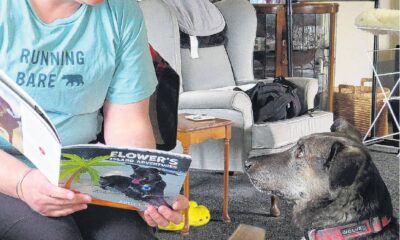Science
Researchers Uncover Secrets of Longevity from 117-Year-Old Woman

A recent study has shed light on the remarkable longevity of Maria Branyas Morera, who is recognized as the world’s oldest living woman at the age of 117. Conducted by a team of researchers from various institutions, the study highlights key factors that may have contributed to her exceptional lifespan and offers insights that could benefit broader public health.
The research, published in early 2023, emphasizes the role of genetics, lifestyle choices, and environmental influences in promoting longevity. Branyas Morera’s life story provides a unique case study, as she has lived through significant historical events and changes, from the Spanish Civil War to the COVID-19 pandemic. Her resilience and adaptability appear to be central themes in her extended life.
Genetic Factors and Lifestyle Choices
According to the findings, genetics play a crucial role in determining lifespan. The researchers noted that Branyas Morera’s family history includes several long-lived relatives, suggesting a hereditary component to her longevity. Furthermore, her lifestyle choices have also been significant. Living in Spain, she has maintained a diet rich in fruits, vegetables, and healthy fats, which are often associated with longer life expectancy.
Moreover, Branyas Morera has emphasized the importance of staying mentally active and socially engaged. She enjoys reading, engaging in conversations, and participating in family gatherings, which the researchers believe contribute to her overall well-being. These factors align with existing studies that link social engagement and mental stimulation to improved health outcomes in older adults.
Environmental Influences and Public Health Implications
The researchers also examined the impact of environmental factors on longevity. Branyas Morera has spent much of her life in the coastal region of Catalonia, known for its moderate climate and access to fresh produce. Such an environment may have provided her with a healthier lifestyle compared to other regions with less favorable conditions.
These findings raise important questions about public health strategies aimed at enhancing longevity across populations. By understanding the elements that contribute to a longer life, policymakers and health organizations can develop targeted interventions. This includes promoting healthy eating habits, encouraging social interaction, and creating supportive environments for the elderly.
In conclusion, the study of Maria Branyas Morera offers valuable insights into the factors that contribute to a long and fulfilling life. While genetics cannot be altered, lifestyle choices and community support can be fostered to improve health outcomes for future generations. As the world continues to grapple with aging populations, lessons from this remarkable individual may pave the way for healthier living and increased longevity for many.
-

 World1 week ago
World1 week agoPrivate Funeral Held for Dean Field and His Three Children
-

 Top Stories2 weeks ago
Top Stories2 weeks agoFuneral Planned for Field Siblings After Tragic House Fire
-

 Sports3 months ago
Sports3 months agoNetball New Zealand Stands Down Dame Noeline Taurua for Series
-

 Entertainment3 months ago
Entertainment3 months agoTributes Pour In for Lachlan Rofe, Reality Star, Dead at 47
-

 Entertainment2 months ago
Entertainment2 months agoNew ‘Maverick’ Chaser Joins Beat the Chasers Season Finale
-

 Sports3 months ago
Sports3 months agoSilver Ferns Legend Laura Langman Criticizes Team’s Attitude
-

 Sports4 weeks ago
Sports4 weeks agoEli Katoa Rushed to Hospital After Sideline Incident During Match
-

 World2 weeks ago
World2 weeks agoInvestigation Underway in Tragic Sanson House Fire Involving Family
-

 Politics2 months ago
Politics2 months agoNetball NZ Calls for Respect Amid Dame Taurua’s Standoff
-

 Top Stories2 weeks ago
Top Stories2 weeks agoShock and Grief Follow Tragic Family Deaths in New Zealand
-

 Entertainment3 months ago
Entertainment3 months agoKhloe Kardashian Embraces Innovative Stem Cell Therapy in Mexico
-

 World4 months ago
World4 months agoPolice Arrest Multiple Individuals During Funeral for Zain Taikato-Fox




















